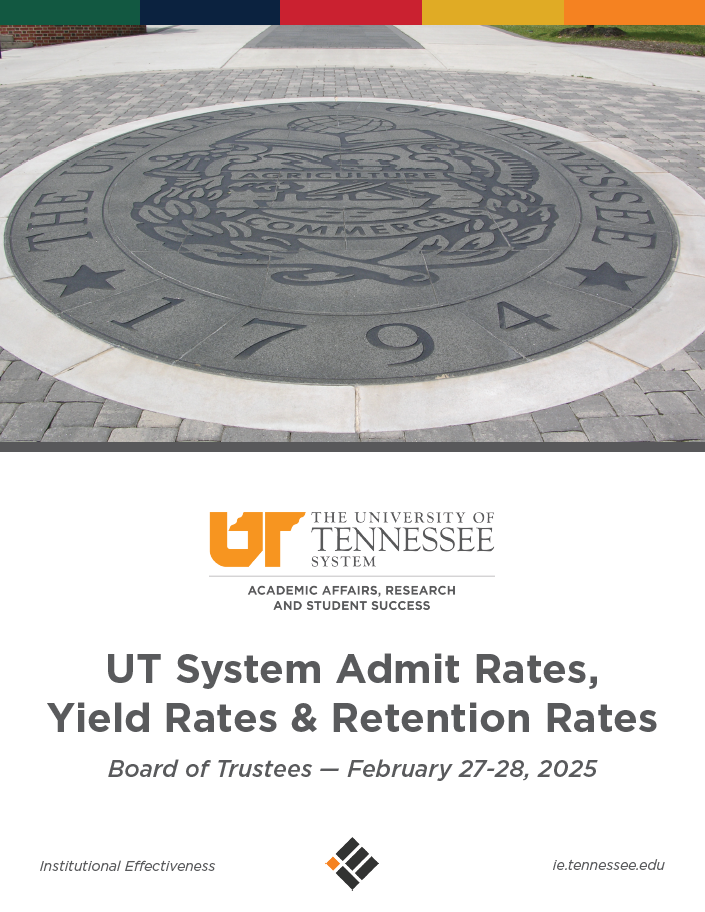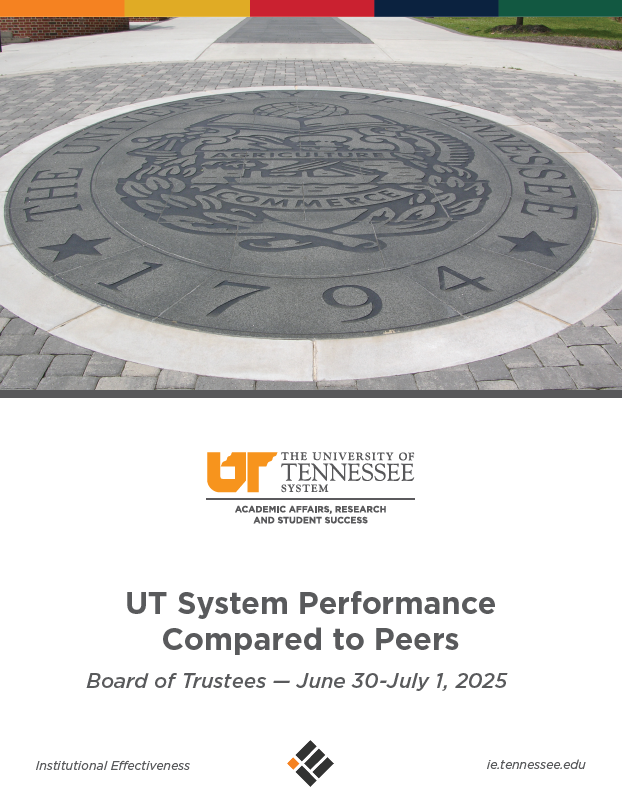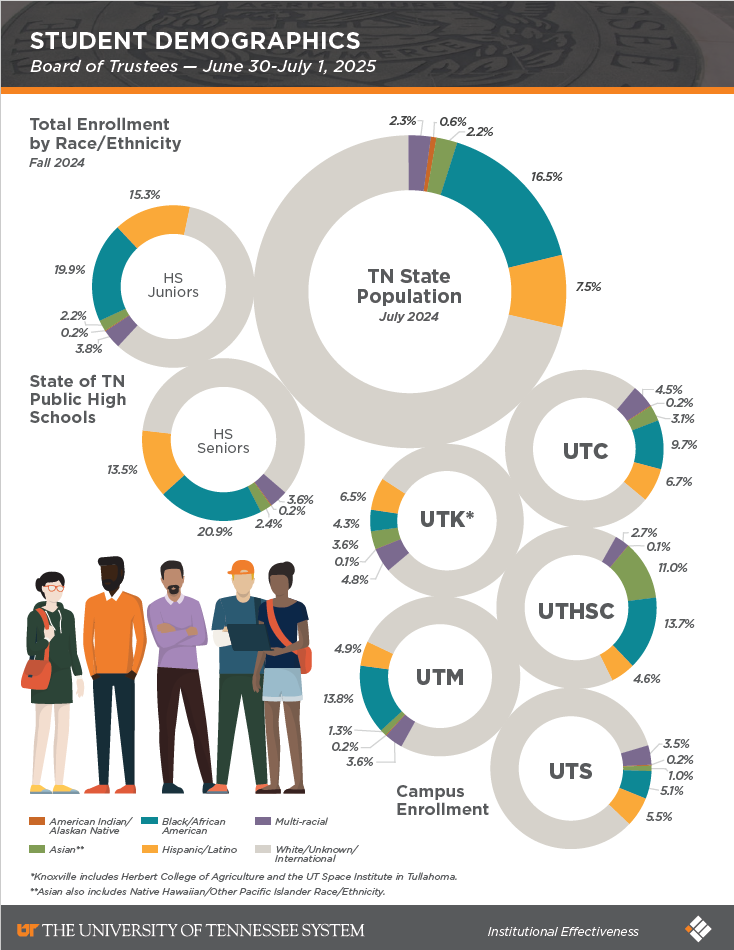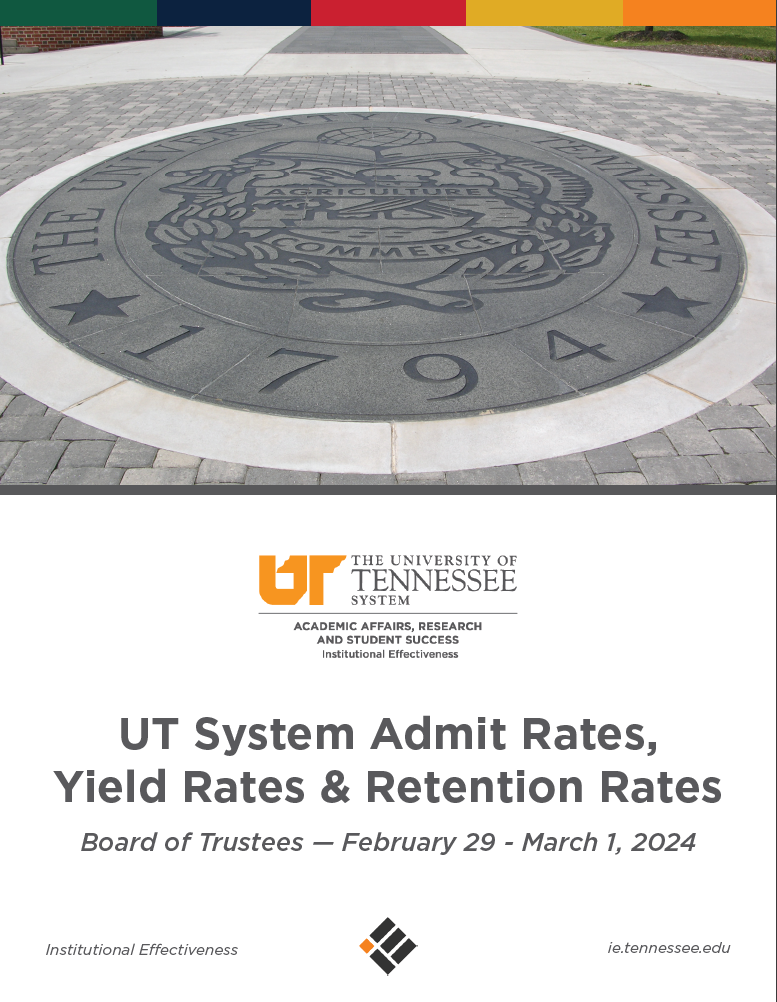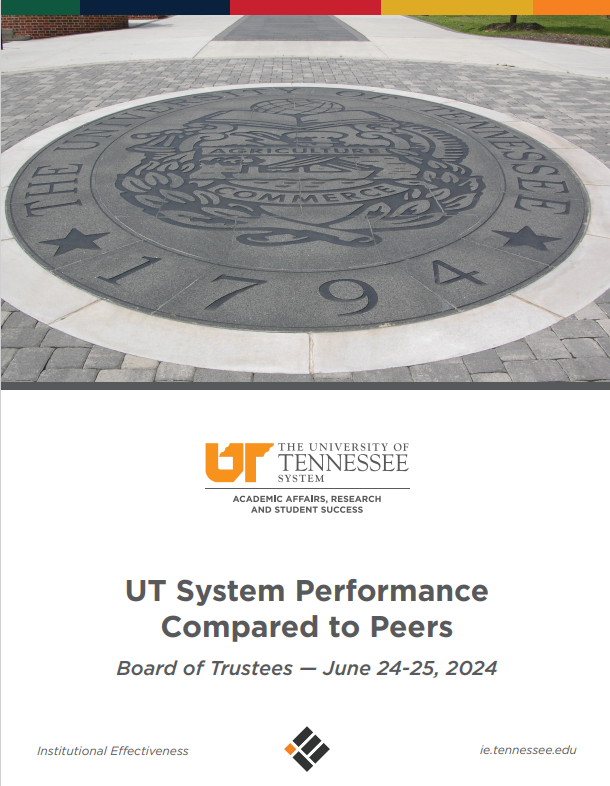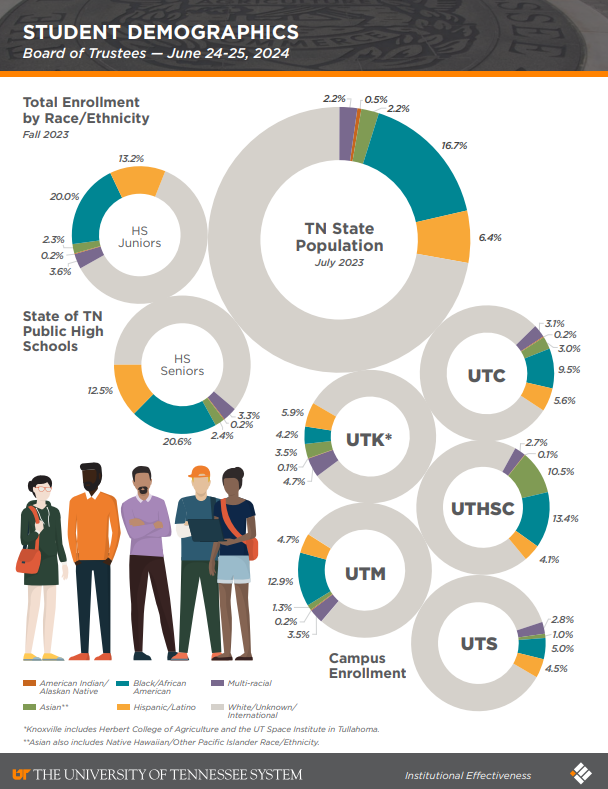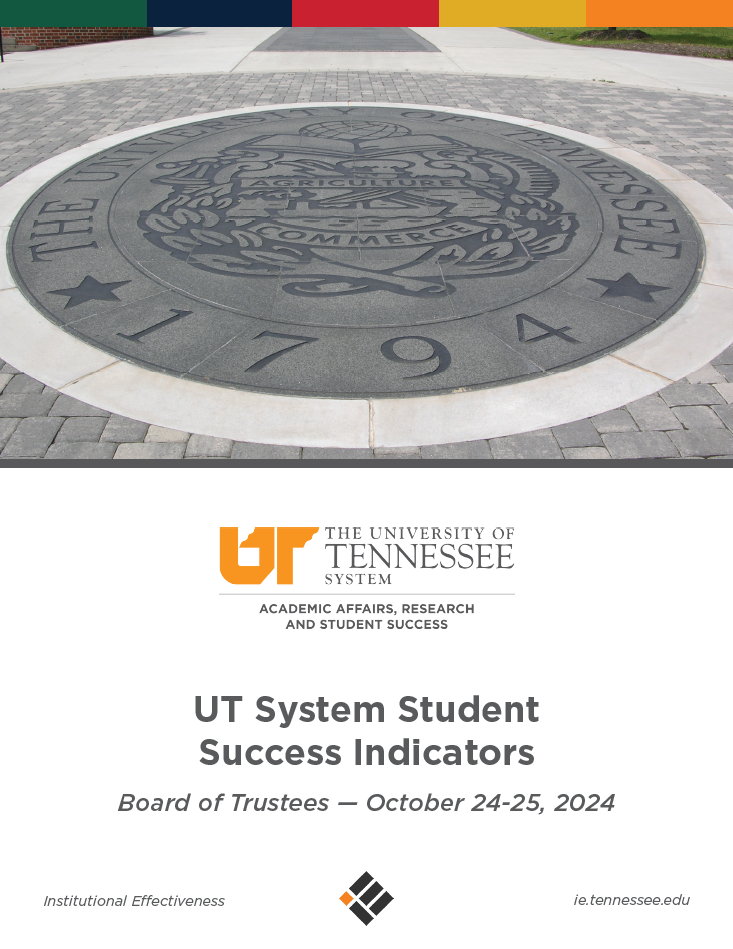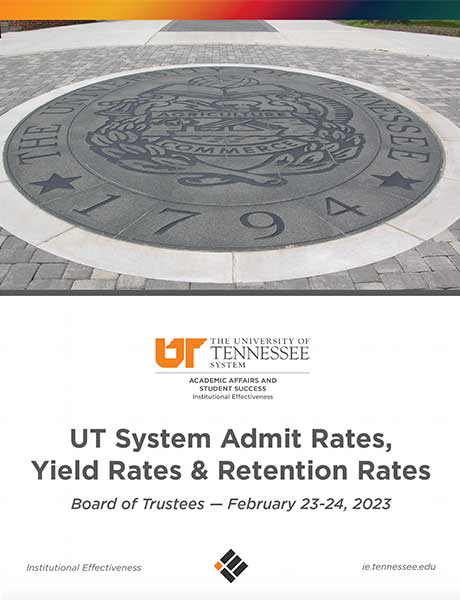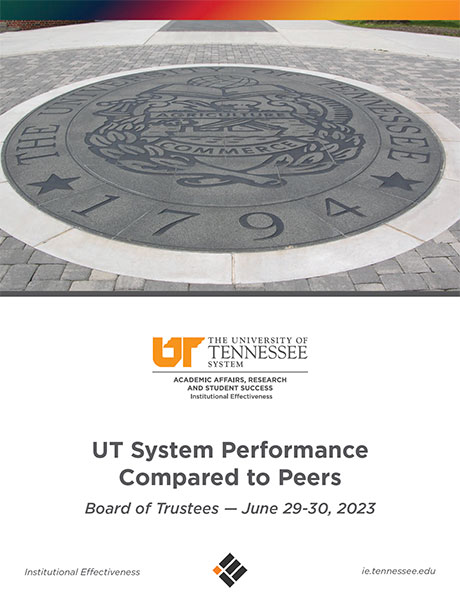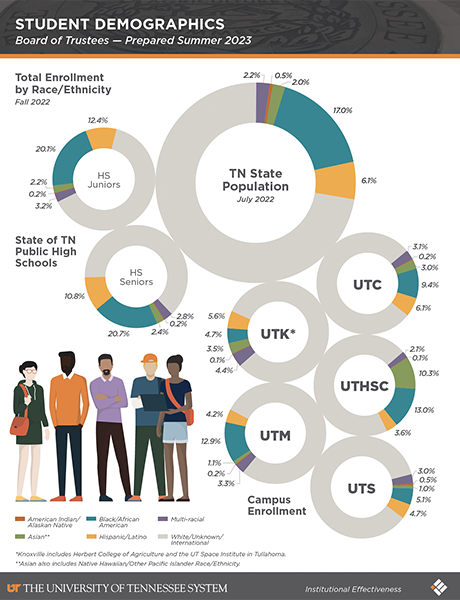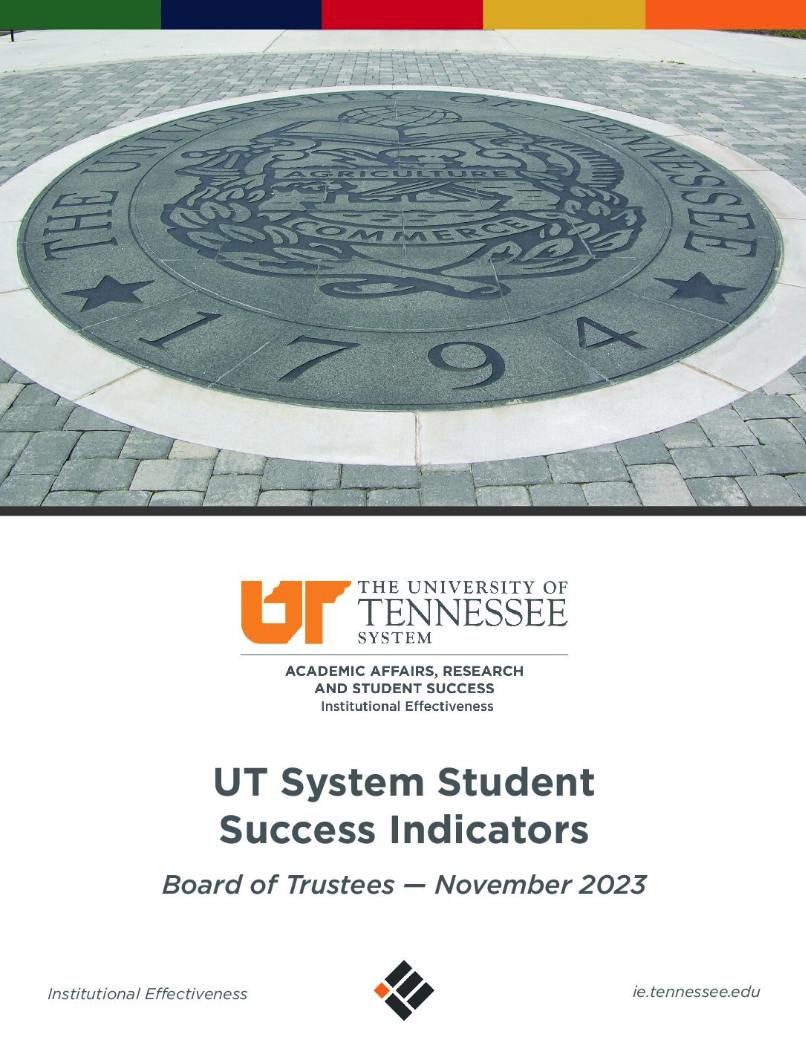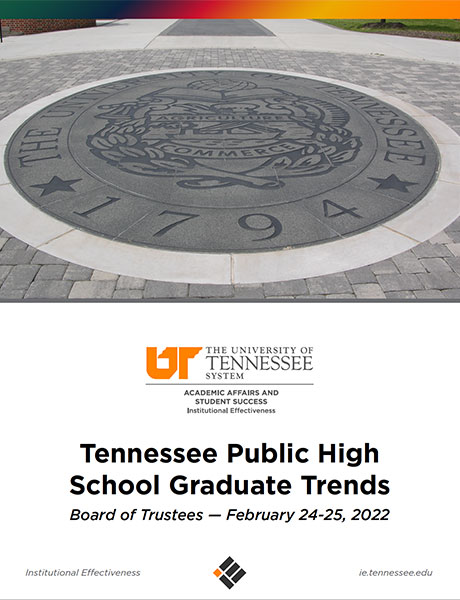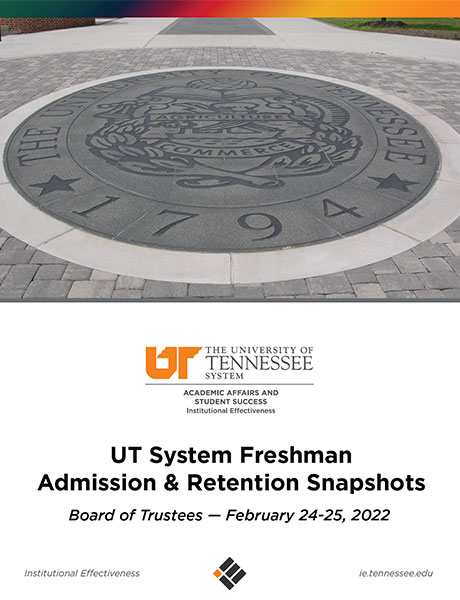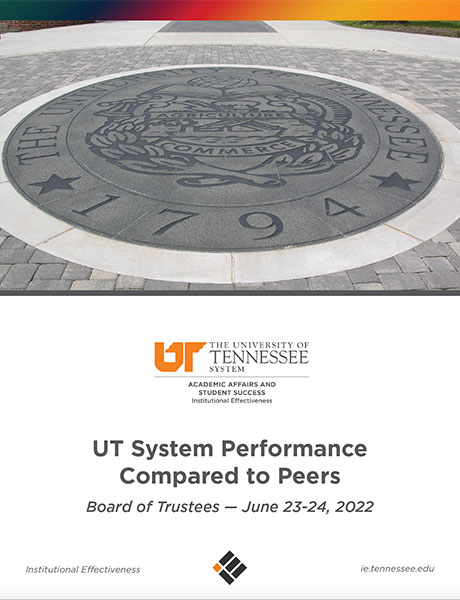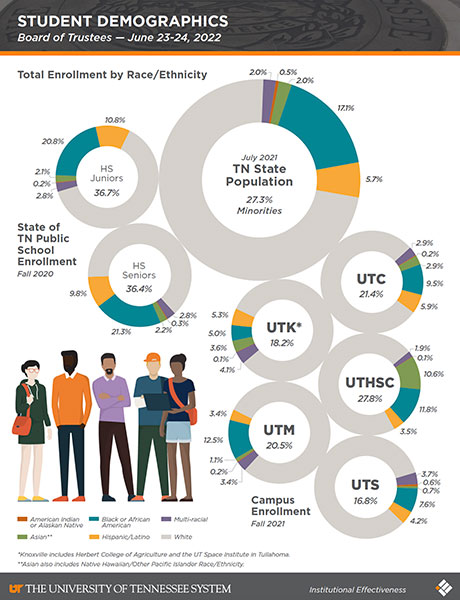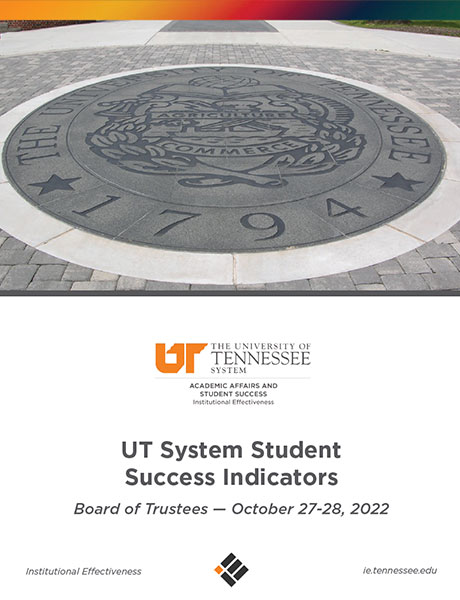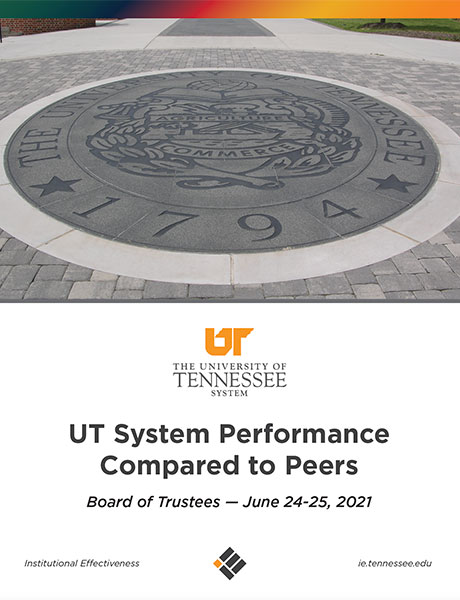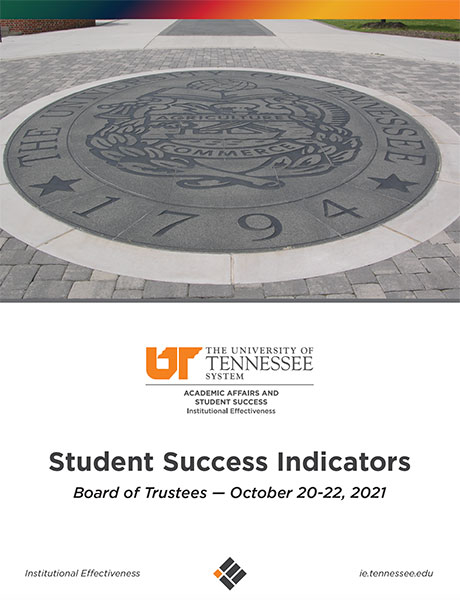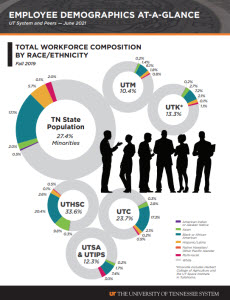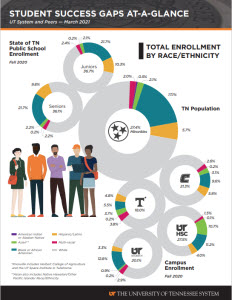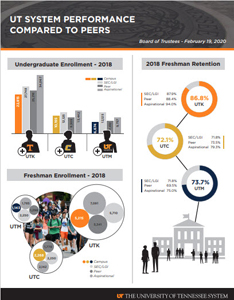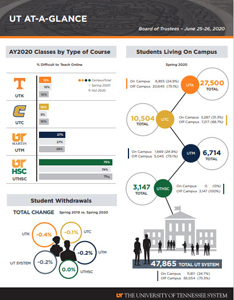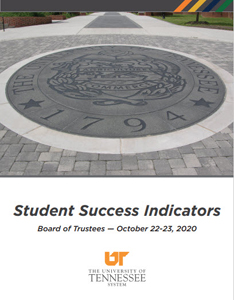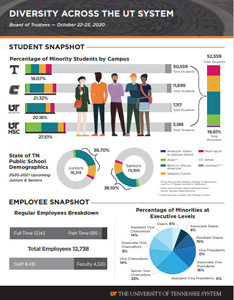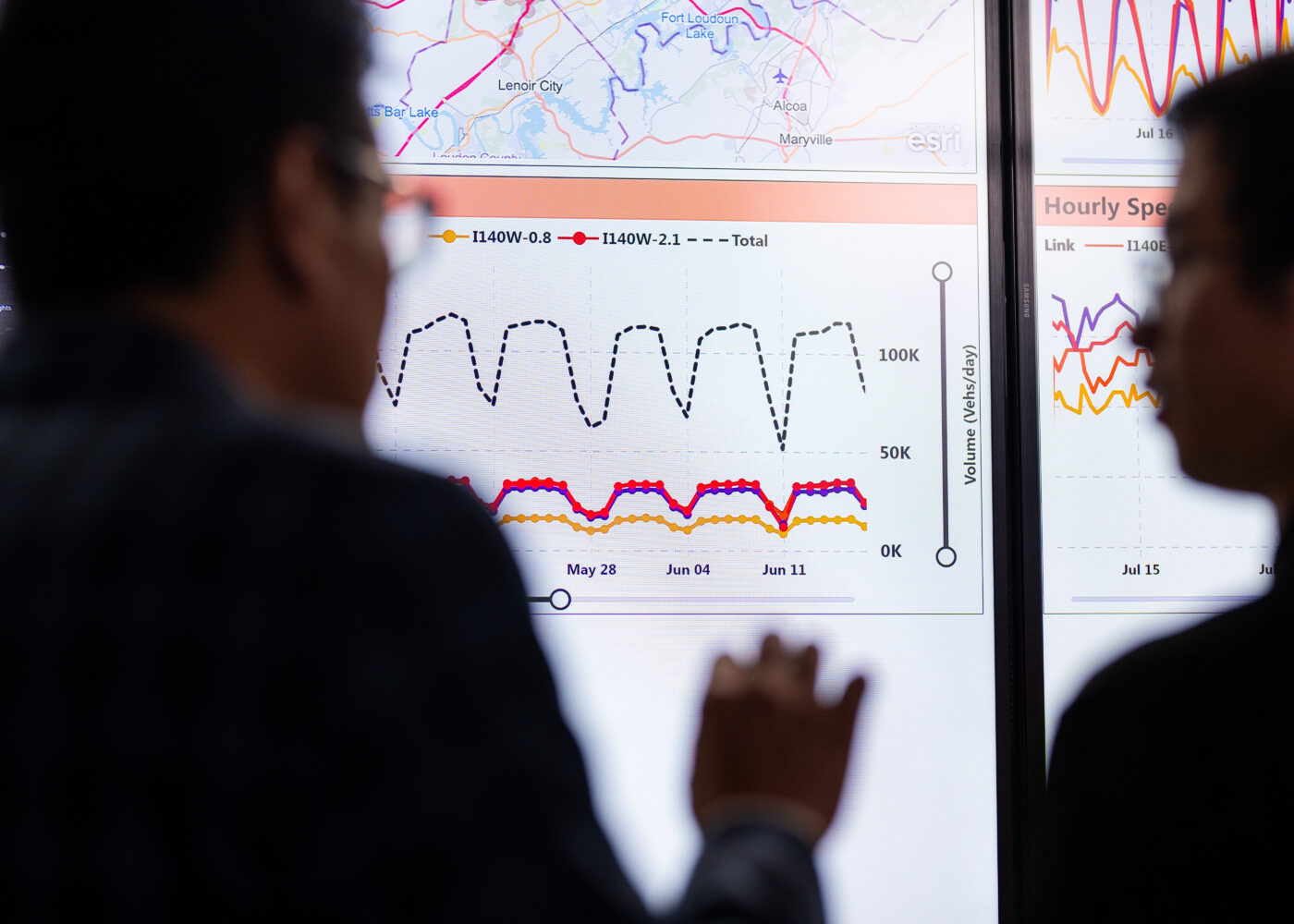Institutional Effectiveness
Institutional Effectiveness at the UT System supports continuous improvement and strategic planning across all campuses by ensuring data is accurate, transparent and meaningful. Learn about the people, tools and services that turn data into insight and drive impact across UT.
Board of Trustees Materials
These infographics offer static snapshots of key data and trends across the UT System. Presented to the UT Board of Trustees, these graphics highlight important metrics such as enrollment, graduation rates and institutional performance. For interactive tools or access to up-to-date data, please visit our Data Dashboard page.
2025
2024
2023
2022
2021
IE Services
Institutional effectiveness services support the UT System through a broad range of strategic and analytical functions. From data analytics to planning, assessment, accreditation, and data visualization, this team provides insights and guidance that help drive data-informed decisions and continuous improvement across the UT campuses. The model of institutional effectiveness outlines the mission, vision and core values that guide our commitment to continuous improvement and data-informed decision making across the UT System.
Data Analytics
Role and Function
Our team collaborates closely with various stakeholders, including the UT System Board of Trustees and UT System administration, as well as external agencies, to provide accurate information and ensure consistent data quality. Key functions include:
- Providing student, employee, research, and financial aid information to the UT Board of Trustees for all public meetings and special requests.
- Standardizing and ensuring accurate collection and maintenance of all UT student data.
- Collaborating with the Tennessee Higher Education Commission (THEC) for student data collection and reporting.
- Overseeing federal and state UT data reporting, including to the Integrated Post-Secondary Education Data System (IPEDS) and to THEC.
Services
We provide a range of services to enhance university operations and strategy:
- Producing reliable institutional data reports for stakeholders.
- Supporting senior leadership with data-driven insights for decision-making.
- Developing accessible dashboards for data transparency.
- Offering advanced analytics, including predictive modeling and benchmarking, to inform strategic planning.
Our goal is to empower the UT System with robust, actionable data, driving excellence in all facets of institutional operation and planning.
On the back end, the data analytics team gathers, warehouses, models, and visualizes data from multiple information systems across all UT campuses and system administration. As part of the Institutional Effectiveness (IE) team, data analytics supports data-informed decision making and provides data for institutional research, strategic planning, and assessment purposes.
The team brings data onto its SQL Servers from a variety of sources across the system. These data enter staging databases and are then transformed and loaded to data warehouse databases. From there, views are created in consolidated data repository (CDR) databases, which is from where data are modeled for reporting. Data are modeled in SQL Server Analysis Services and Power BI for use in reports and Power BI dashboards. Publicly available Power BI dashboards created and maintained by the team team are available at data.tennessee.edu.
Access to the team’s SQL Servers is granted on a case-by-case basis and is usually granted only to users who have access to the data in the source system (e.g., a user cannot access additional information from IRIS through our servers; only what they can see in IRIS itself). Users should first request access to information on databases on their own campuses, when possible. Security is managed by data owners in conjunction with the DTS Infrastructure team.
If you work with data at UT and would like to participate in the UT Systemwide Business Intelligence group that meets quarterly, find the “UT Systemwide BI Workgroup” on Microsoft Teams, or reach out to the team at bi@tennessee.edu.
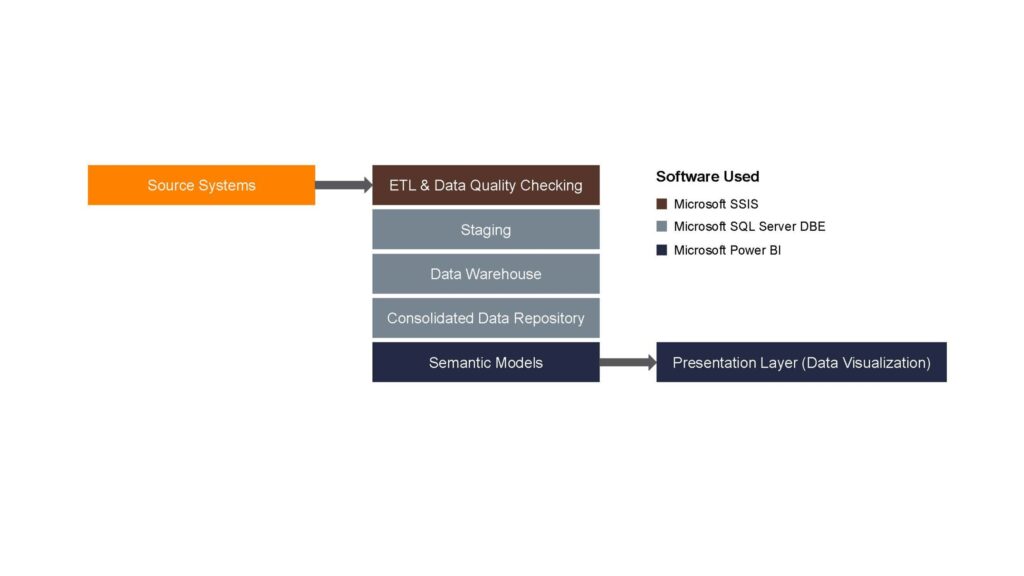
Data source systems (IRIS, ANDI, Banner, and others) feed into the first layer, Extract, Transform, Load (ETL) and Data Quality Checking, powered by Microsoft SQL Server Integration Services (SSIS). After passing the quality check, data is stored in a staging environment, Data Warehouse, and Consolidated Data Repository, all powered by Microsoft SQL Database Engine.
A data dictionary for all sources and definitions is maintained independently for this data model.
Semantic models powered by Microsoft Power BI interpret information from the Consolidated Data Repository for a presentation layer. These take the form of data visualizations, including reports and dashboards generated with the Power BI reporting service.
Contact
For questions and information about these services, please contact data@tennessee.edu.
Data Visualization
Data visualization, the graphical representation of data, makes information more understandable and enables leaders to make data-informed decisions. When done effectively, data visualization increases the impact of the information and helps viewers quickly grasp key insights and patterns. Conveying stories about the UT System and its campuses with compellingly organized and visualized data is a distinctive competency of the IE team, as evidenced by its portfolio of infographics/reports and dashboards.
Contact
For questions and information about these services, please contact data@tennessee.edu.
Strategic Planning
The strategic planning coordinating team promotes a culture of continuous improvement and enhances evidence-based decision making by offering services in strategic planning. The team provides leadership, support, and coordination for planning and goal setting activities as well as facilitates the planning process for the UT Systemwide Strategic Plan. We are available to consult on and provide levels of support at the system, division, campus, department, and unit levels.
The strategic planning coordinating team offers assistance in the following stages of the strategic planning process:
- Process framework creation.
- Benchmarking, environmental scanning, and resource gathering.
- Mission and vision development.
- Design and facilitation of activities to engage key stakeholders in the strategic plan process.
- Survey creation, execution, and analysis.
- Gap, SWOT, and SOAR analysis
- Development of strategic, action, and implementation plans
- Development of assessment plans, including key metrics and strategically aligned measures.
- Risk assessment (identification of threats and opportunities) related to strategy selection and achievement of goals and objectives.
- Resources are also available to assist in the development and implementation of strategic plans.
Strategic Planning Coordinating Team
Cheryl Fogler
Director of Planning & Decision Support
cherylfogler@tennessee.edu
Ashley Ludewig
Assessment Coordinator
aludewig@utk.edu
Lyndsey Carter
Administrative Coordinator
lyndsey@tennessee.edu
Contact
For questions and information about these services, please contact Cheryl Fogler.
Assessment
UTSA Assessment promotes a culture of continuous improvement and enhances evidence-based decision making by offering support in the development and implementation of academic and administrative assessment initiatives. The Assessment Coordinator is available to consult on projects at the system, division, campus, department, and unit levels, including crafting program goals and outcomes, identifying key metrics and aligned measures, survey design, qualitative data collection and analysis, and reporting for accreditation purposes.
Contact
For questions and information about these services, please contact Ashley Ludewig, Ph.D. Assessment Coordinator, at aludewig@tennessee.edu.
Accreditation
The institutional effectiveness team hosts periodic meetings of the UT System Institutional Effectiveness Network (UTSIEN), a forum for inter-campus collaboration and sharing best practices in accreditation, planning, assessment, and institutional research.
What is Institutional Accreditation?
Accreditation is a peer-review process by which institutions of higher education evaluate and enhance quality via the attainment of minimum standards. View a list of institutional accrediting agencies recognized by the U.S. Department of Education. All campuses of the UT System are accredited by the Southern Association of Colleges and Schools Commission on Colleges (SACSCOC).
UT Campus SACSCOC Accreditation Liaisons
| Campus | SACSCOC Liaison | Next Reaffirmation |
|---|---|---|
| UTK | Dr. Heather Hartman | 2025 |
| UTC | Dr. Cindy Taylor Williamson | 2032 |
| UTS | Dr. Chris Mattingly | 2029 |
| UTM | Dr. Stephanie Kolitsch | 2033 |
| UTHSC | Dr. Allen Dupont | 2030 |
UT Data Dashboards
The UT data dashboards offer interactive access to key data across the UT System. Designed for transparency and informed decision-making, these interactive tools allow users to explore trends in key areas like enrollment, student success, research activity and statewide impact.
Model of IE
The model of institutional effectiveness outlines the mission, vision and core values that guide our commitment to continuous improvement and data-informed decision making across the UT System.
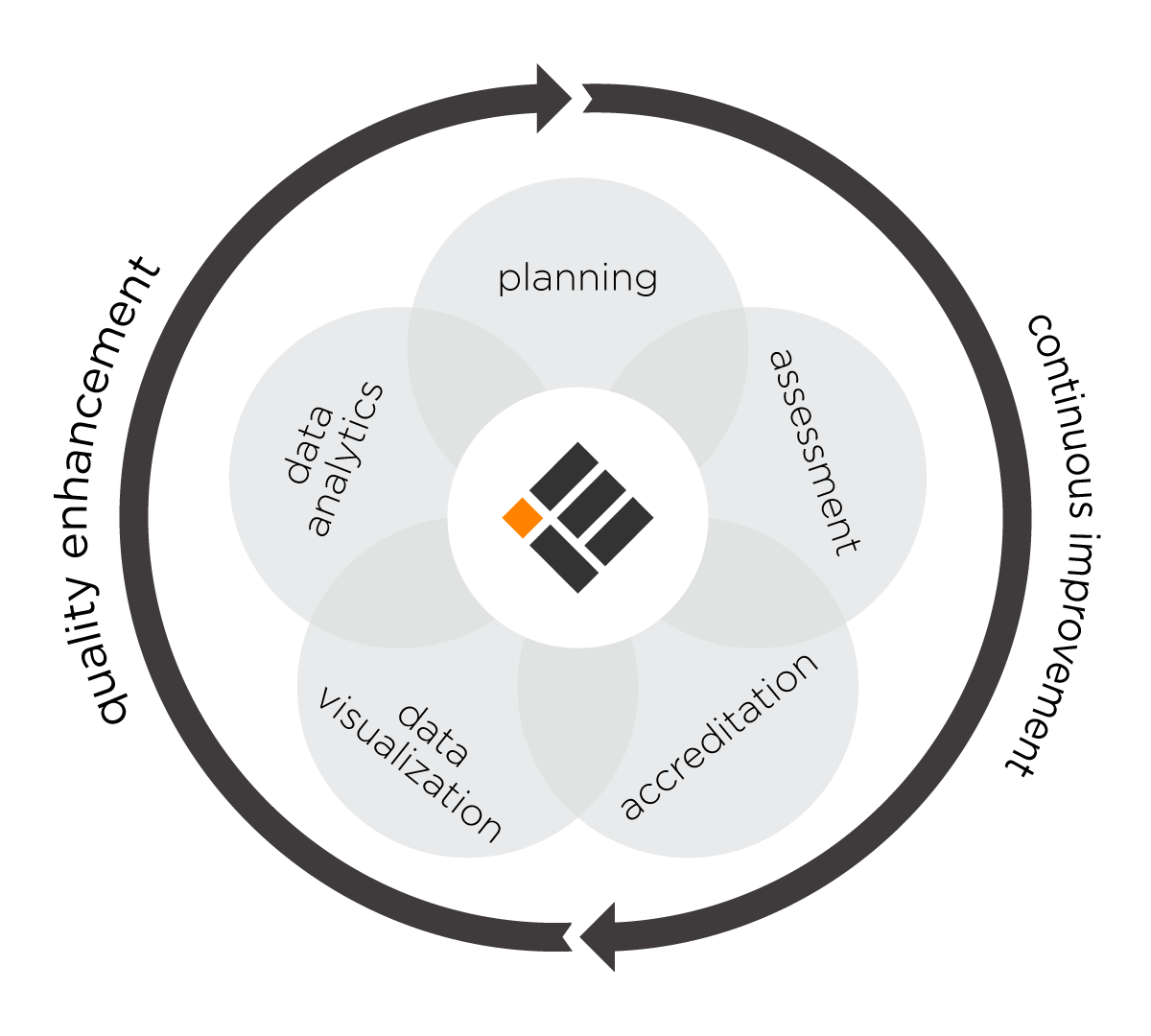
Mission
The institutional effectiveness team promotes a culture of continuous improvement and evidence-based decision making by offering services in data analytics, planning, assessment, accreditation, and data visualization.
Vision
The IE team will be recognized as an exemplar of best practices and leader among system institutional effectiveness units.
Values
Quality
We hold ourselves to the highest standards in our work and in our interactions with others, striving for excellence in all we do.
Growth
Through innovation and creativity we aim to continuously learn and improve our products, our workstyle, and our collaborations.
Authenticity
We represent ourselves as individuals, our team, and the university with integrity and transparency.
Initiative
We are committed to proactively leading and taking action, embracing opportunities to innovate and excel without waiting for direction.
Unity
We work collegially as a cohesive team and endeavor to bring the university system together positively around data.
Positivity
We embrace optimism and approach situations with a constructive and hopeful attitude.
Inclusivity
We respect diversity of thought, cultures, work, skills, and people.

